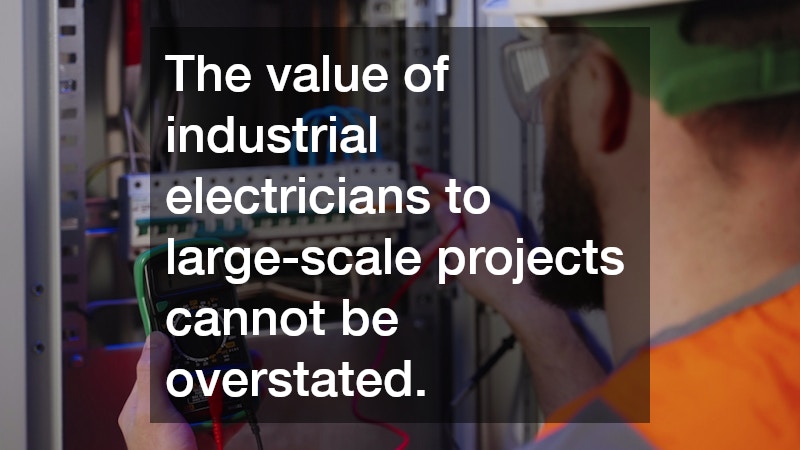Large-scale projects demand precision, reliability and expert coordination. Whether it’s a manufacturing facility, processing plant or logistics hub, the complexity of these environments requires professionals with highly specialised skills. Among those professionals, few play a more critical role than industrial electricians. Their expertise goes well beyond basic wiring, touching nearly every aspect of electrical infrastructure, safety compliance and operational continuity.
Expertise in High-Voltage Systems & Infrastructure
Unlike domestic or commercial electricians, those trained in the industrial space manage large-scale electrical systems that often involve high voltages, heavy machinery and automation controls. These professionals are responsible for the installation, maintenance and repair of critical components that keep operations running efficiently. Their deep understanding of complex circuitry, programmable logic controllers and industrial switchgear ensures that facilities can operate safely and continuously.
High-voltage systems require a level of care and attention that only experienced electricians can provide. Poor installation or inadequate maintenance can lead to severe failures, costly downtime or workplace hazards. This is particularly important in facilities that run 24 hours a day, where even minor interruptions can lead to significant financial losses. For these reasons, industrial projects cannot afford to rely on generalists when it comes to electrical work.
Compliance & Risk Management
One of the most important responsibilities these professionals carry is ensuring compliance with all relevant standards and safety codes. Industrial worksites are subject to rigorous inspection and regulation. Any oversight in installation or testing could result in penalties or increased liability. Therefore, electricians who specialise in this field bring a thorough understanding of legal obligations and industry best practices.
They not only follow national codes but also maintain documentation, perform risk assessments and test systems for functionality and safety. Their role is proactive—identifying potential hazards before they become actual problems. This contributes to a safer workplace and helps avoid disruption to operations, which can otherwise derail the progress of large-scale projects.
Their training in fault detection and safety procedures also means they are well equipped to manage emergencies. In fast-paced industrial settings, the ability to quickly assess and resolve an electrical issue can prevent property damage, protect workers and keep productivity on track.
Integration With Other Trades & Project Phases
On major construction or infrastructure projects, collaboration between trades is essential. Electricians working in industrial settings are accustomed to coordinating with engineers, project managers, plumbers and other specialists. Their involvement often begins in the early design phase and continues through commissioning and maintenance.
This integration is critical for aligning the electrical system with mechanical components, structural plans and operational requirements. These electricians understand how to interpret blueprints, provide input on feasibility and adapt their installations to real-world site conditions. Their contribution ensures electrical networks are not only efficient but also compatible with every other system on site.
In many cases, their work also involves planning for future expansion or upgrades. Large-scale operations frequently evolve, requiring new equipment or layout changes. Having professionals who can anticipate these needs and build adaptable systems helps prevent the need for costly overhauls later on.
Maximising Efficiency & Reducing Downtime
In industrial environments, time is money. Any disruption can have a domino effect across production, logistics or service delivery. Electricians in this field are skilled in creating systems that optimise energy use, minimise downtime and support the long-term performance of equipment.
Through careful load balancing, energy monitoring and routine preventive maintenance, they help operators get the most out of their infrastructure. They may also install energy-efficient lighting, motor controls or backup power systems to further enhance efficiency. Their insights into power distribution and usage trends support better decision-making at the management level.
Moreover, their ability to quickly identify and correct faults reduces downtime significantly. Whether through scheduled inspections or on-call emergency work, their presence is a vital layer of protection for any operation relying on uninterrupted power.
Specialist Tools & Continuous Training
Modern industrial environments are constantly evolving with new technology, automation and regulatory updates. To keep pace, electricians in this field must undergo continuous training and certification. They are often qualified to work with a wide range of tools, from thermal imaging cameras to digital multimeters, control panels and remote monitoring systems.
The nature of their work requires more than just technical skill—it requires adaptability and problem-solving. As industries invest in smart infrastructure or transition to more sustainable energy sources, the role of these specialists becomes even more crucial. They are often the first to implement new systems or troubleshoot issues that haven’t been encountered before.
This emphasis on innovation ensures that industrial operations benefit not only from reliable electrical systems but also from ongoing improvements in performance, cost efficiency and safety.
The value of industrial electricians to large-scale projects cannot be overstated. Their skills underpin the infrastructure that drives productivity, safety and long-term sustainability. From installation and compliance to collaboration and innovation, they deliver results that general electrical services cannot match.
By working alongside other trades and adapting to each phase of development, these professionals help projects stay on schedule, meet regulatory requirements and perform efficiently over time. Their contribution ensures that operations can withstand the pressures of scale and continue delivering value well into the future.
For any organisation investing in large-scale infrastructure, engaging qualified professionals in this field is not just a good decision—it’s essential. Through their knowledge, precision and dedication, industrial electricians remain a cornerstone of successful industrial development.



